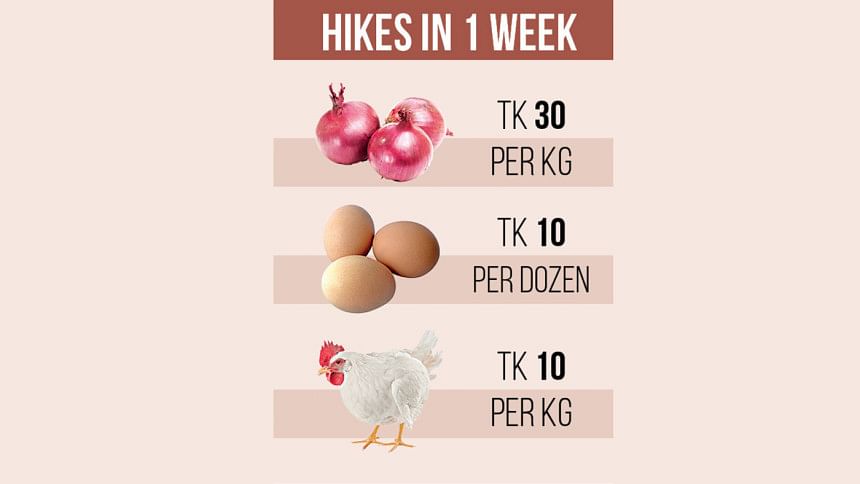Essential prices keep spiralling

Mohammad Shahid looked at the shopkeeper in Karwan Bazar in disbelief after hearing that a kg of onions was selling for Tk 120.
When he last bought it two days ago from the same market in the capital, the price was Tk 90.
Since haggling over the price of onions, considered an essential cooking ingredient in most households, would not be of much use, Shahid yesterday bought half a kg although he originally intended to buy more.
"I have been making such adjustments, buying fewer and fewer goods for the last one year. Sometimes I drop items on my shopping list," said Shahid who works at a fish market in the city.
His wife Nilufer Begum was also at the market looking for bargains.
"It is tough for people like us to put food on the table," she said.
These correspondents yesterday saw many people like Shahid and Nilufer being dismayed by the rising prices at the kitchen markets in Kachukhet, Ibrahimpur, and Shewrapara.
People had to spend Tk 140-150 for a dozen brown eggs, up from Tk 135-140 a week ago; Tk 190-200 for a kg of broiler chicken, up from 180-190; and Tk 300-330 for a kg of Sonali chicken, up from Tk 290-320.
Prices of papaya, bean, ladies' finger, pointed gourd, and bitter gourd have also increased by Tk 5-10 in a week while the prices of potatoes, green chilies, and tomatoes have fallen by Tk 5-10.
Rice, edible oil, lentils, spices, fish, beef, and mutton prices have been stable for almost a month.
Kamal Hossain, a grocery store owner in Karwan Bazar, said several big companies were stockpiling goods and creating an artificial crisis in the market.
"If the government cannot break up this syndicate, the prices of daily essentials will not come down," he said, adding, "We are selling products at high prices because we are purchasing these at high prices," he said.
Ghulam Rahman, president of the Consumers Association of Bangladesh, said devaluation of the taka against dollar, inflation, and import duties were driving up the prices.
In Bangladesh, the inflation surge was triggered by supply chain disruptions due to the Covid-19 pandemic and the Russia-Ukraine conflict. Later, in 2022, while global commodity prices started to decline, the significant deficits in Bangladesh's current account balance and overall balance of payments led to a sizeable depreciation of the taka.
So, despite the recent global commodity price decline, Bangladesh's economy couldn't benefit due to the significant domestic currency depreciation, which subsequently raised import prices, contributing to inflationary pressures.
The taka has lost its value by about 30 percent in the past two years, making imports costlier for the country.
Additionally, second-round effects from adjustments in energy prices and imperfections in the commodity market further compounded high inflation, according to the Bangladesh Bank.
Inflation declined for the fifth consecutive month in January. But the rate is much higher than the country used to witness before the external and internal sectors brought on the current unprecedented level of inflation since the middle of 2022.
The pass-through of a sharp depreciation of the local currency accounted for half of the inflation surge in the last financial year, according to the International Monetary Fund.


 For all latest news, follow The Daily Star's Google News channel.
For all latest news, follow The Daily Star's Google News channel. 







Comments